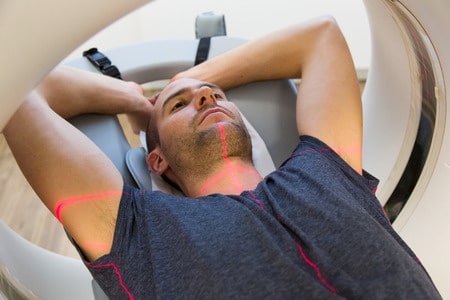Last updated on February 15th, 2023 at 05:18 am
Scanxiety (scan anxiety) – the peek in anxiety that happens as patients with cancer prepare for a scan such as an MRI, PET. bone scan or CAT etc.
Often the anxiety begins to build in the week(s) before the next scan. It can lead to difficulty concentrating, problems with sleep, fatigue, and a general sense of being on edge. While fear and worry associated with an upcoming scan is normal, it important to manage these feelings so that they do not interfere with your day-to-day life.
Some patients experience symptoms of post-traumatic stress as a result of previous traumas or particularly difficult courses of treatment. For these patients, the fear associated with scans interferes with daily life and leads to sleeplessness, nightmares, changes in mood and avoidance including repeated rescheduling or missing tests.
Mindfulness to Deal with Difficult Thoughts and Emotions
As you prepare for an impending scan, you may find that you experience an increase in feelings of anxiety and thoughts about possible poor outcomes. By observing how your emotions are experienced in the mind and body you can begin to use your mind in a new way to manage those feelings more effectively. Here are two helpful mindfulness meditation exercises that can be used when working with difficult emotions such as anxiety about an impending scan:
http://marc.ucla.edu/mpeg/04_Meditation_for_Working_with_Difficulties.mp3
http://mindfulwaythroughanxietybook.com/wp-content/uploads/mp3/Emotions_and_pSensations.mp3
Another exercise that can be helpful in addressing anxiety is to simply observe your thoughts and emotions as they come. Rather than allowing anxiety-filled thoughts to take over your thinking in the days before a scan, you can use mindfulness exercises to disengage from these thoughts. Here is a helpful exercise for observing your thoughts and feelings:
http://mindfulwaythroughanxietybook.com/wp-content/uploads/mp3/Clouds_and_Sky.mp3
While the days and weeks leading up to scans are often anxiety provoking, having tools to help you manage those emotions can make a big difference in whether you are able to keep your appointment and how emotionally prepared you feel for the day. You may also find it useful to practice some of the breathing exercises found below to help during your test. If you find that you are continuing to have difficulty managing your anxiety post-treatment, it may be helpful to seek out the help of a therapist who can work with you on additional techniques to address your worries.
Additional Resources
For additional mindfulness exercises visit:
The Mindful Way Through Anxiety
http://mindfulwaythroughanxietybook.com/exercises/
UCLA Mindful Awareness Research Center
http://marc.ucla.edu/body.cfm?id=22
I sincerely hope that you have found this post helpful. Please look for more upcoming blogs in this series on mindfulness and cancer both on our website and on our Facebook page at www.facebook.com/rowancenterla.







